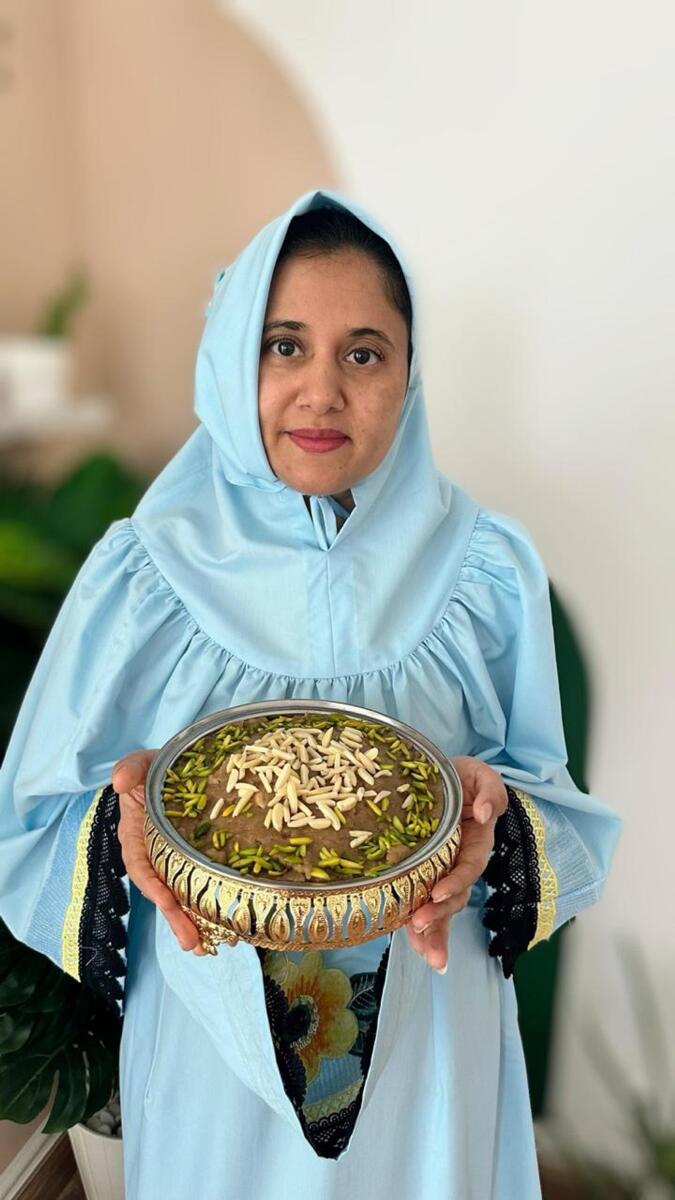From lazy cake to lachka: Iftar menus in UAE homes from around the world
Fasting residents of different nationalities shared their favourite dishes; here are our top picks

Ramadan, a time of fasting, prayer, and self-reflection, is now in its final stretch. Khaleej Times asked fasting residents of different nationalities to share their favourite iftar dishes. Here are our top picks:
- Mahalabia (milk pudding)
Sheikha Khamis, Emirati
Mahalabia, or Muhallebi, is a creamy Middle Eastern milk pudding with nuts, rose petals, and/or sugar syrup. Legend has it that it was introduced into Arab cuisine in the late seventh century by a Persian cook from the Sasanian Empire. The cook served it to an Arab general named Al-Muhallab ibn Abi Sufra, who enjoyed it so much that he named it after himself.
Stay up to date with the latest news. Follow KT on WhatsApp Channels.

Sheikha Khamis
- Tinginys (chocolate salami)
Viktorija Umair, Lithuania
Tinginysis, also known as the lazy cake, lives up to its name with its delightful blend of biscuity crunchiness and chocolatey goodness. According to Viktorija, this dessert is easy to make and requires no baking, making it a budget-friendly delight. Its recipe is said to have originated in the sixties when a woman inadvertently made her chocolate mixture too sweet. To fix the situation, she added broken-up biscuits, giving birth to the first tinginys.

Viktorija Umair
- Aviena su darzovemis (lamb with veggies)
Maimouna Liskauskaite, Lithuania
Dubai resident Maimouna Liskauskaite, who embraced Islam in 2003, also hails from Lithuania. Among the dishes gracing her iftar table, crispy bread with garlic and buns with cheese hold a special place. However, her favourite is Aviena su darzovemis (lamb with veggies), reminiscent of the Moroccan tagine, served in a small clay pot.

Maimouna Liskauskaite
- Roz Bel Khalka (caramelised rice with nuts, resins)
Farida Talaat, Canada
Roz bel Khalta, also known as Khalta rice, is an Egyptian variation of rice pilaf, incorporating a blend of spices, sweet and tangy dried fruits, assorted nuts, and meat. Dubai-based Canadian quilt artist Farida Talaat, originally from Egypt, fondly remembers her mother's tradition of serving it on their iftar table every Ramadan. "I can still remember the fragrant cinnamon aroma from my childhood," she reminisces.

Farida Talaat
- Lachka (whole wheat halwa)
Dr Fatema Mehrim, India
Breaking from tradition, a Bohra meal starts with dessert rather than ending with it. At the forefront is Lachka, the quintessential sweet dish of the Bohri community. This delightful treat is made from whole wheat soaked overnight and mixed with semolina, jaggery, and ghee. Served piping hot with a dollop of chilled yoghurt, as Dr Fatema describes, it bursts with flavours with every spoonful.

Dr Fatema Mehrim
- Kashmiri Yakhni
Haseena Akhtar, India
Kashmiri Yakhni is a dish with mutton and whole spices, traditionally served in a yoghurt-based gravy. It is a staple in the region's celebratory Wazwan (multi-course feast). The infusion of whole spices lends rich flavour, while ginger and fennel powder add a delightful aroma to the curry. Haseena Akhtar continues this cherished tradition by bringing it to iftar tables during her visits to her son in Dubai.

Haseena Akhtar
- Dum Keema (minced meat)
Madiha Abbas
Dum Ka Qeema, also called Bihar Qeema, is a popular Pakistani dish with minced meat marinated in flavourful spices and slow-cooked until tender. Madhia Abbas, a 35-year-old entrepreneur from Karachi, often makes it during Ramadan. Madiha Abbas says it is one of her go-to dishes during iftar, and she often prepares it herself. This recipe comes from the royal kitchens of the Nawabs of Hyderabad Deccan, known for its rich taste. It's best enjoyed with naan, paratha, or romali roti.

Madiha Abbas
- Batt O Mash (mixed pulses)
Asma, Pakistan
Batt O Mash holds a cherished place in the culinary landscape of Balochistan, Pakistan's largest province, where Ajman-based influencer Asma Abdullah hails from. Amidst Balouchi cuisine's rich offerings like Dumpukht, Chilaanch, and Saaji, Batt O Mash stands out as Asma's favourite. It combines two varieties of pulses, offering both savoury and sweet variations. A staple during the rainy season across Balochistan, in Asma's household, it takes centre stage for much of Ramadan, owing to her husband's fondness.

Asma Abdullah
- Samosasa and gato arouille (fritters)
Zaahirah Muthy, Mauritius
Mauritian cuisine is renowned for its diverse flavours, influenced by Indian, African, Chinese, French, and British culinary traditions. A popular iftar snack in the island country is samosas—crunchy, flaky, deep-fried triangular pastries filled with potato, corn, cheese, chicken, or fish. Zaahirah Muthy, a Mauritius native residing in Dubai, expresses her love for this delectable treat. Another beloved Sino-Mauritian street food delicacy is Gato Arouille, consisting of small taro dumplings seasoned with grated ginger, salt, and sugar.

Zaahirah Muthy
With inputs from Humera Ashiq Hussain
ALSO READ:
- Ramadan in Dubai: This community transforms into massive food festival every night during holy month

A Staff Reporter
Got an interesting story to tell in the UAE? We want to hear all about it. Write to the nation's best reporting team, as we cover the emirates like no one else.





